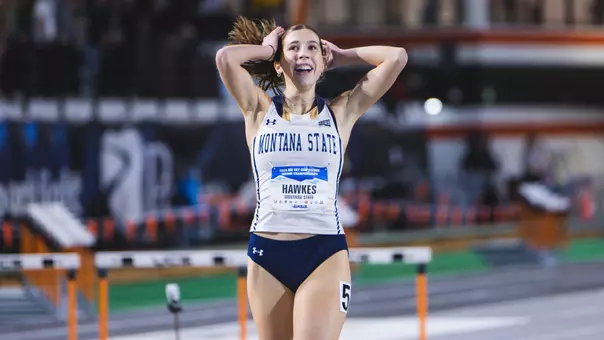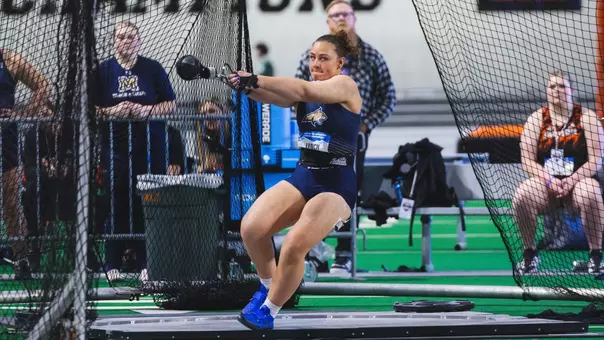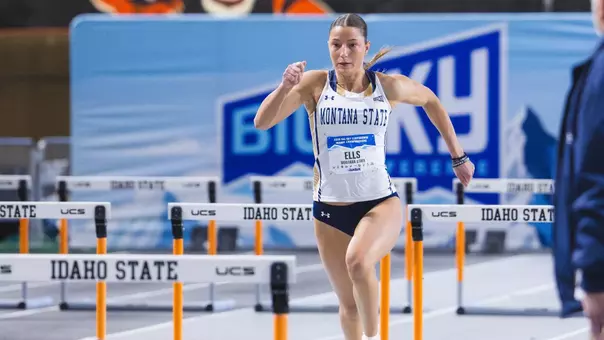
Photo by: R. Dean Hendrickson
Zach Smith Balances Pursuits on Track & MSU’s Army ROTC Program
5/7/2020 2:11:00 PM | Men's Track and Field
MSU's Zach Smith came to Bozeman focused on developing within the school's ROTC program, but his sights were also set on still competing athletically at the college level
BOZEMAN, Mont. – Zach Smith's days at Montana State never looked like the typical Division I student-athlete's schedule. Beyond the grind of a full academic slate and practice schedule alongside his peers, Smith was also handling his professional pursuits as a member of MSU's Army Reserve Officers' Training Corps.
He wouldn't have had it any other way.
Smith initially intended to play football at the Division II level, committing to Southern Oregon in February of 2016. His plans changed in April of that year. Plans that have shaped where he's at and where he still has yet to go.
"In April I received an ROTC scholarship to attend one of three schools," Smith said with MSU being one of the options. "Montana State was always my dream school, so I decided that I'd take the opportunity to go to Montana State rather than play football."
That decision was based off a previous visit to MSU as a sophomore in high school. The native of Olympia, Wash., said he fell in love with the area and people of Bozeman. Even though he'd be passing on an opportunity to continue his football career, he had also been a standout as a sprinter on the track and field team at Olympia's Capital High School.
"I definitely was focused on number one academics and then training for ROTC and becoming submerged within their program, their values and ideas," Smith said of when he arrived at Montana State in the fall of 2016. "I ran in one open track meet my freshman year, but I didn't run well enough to get the attention of anyone. I took it as that I thought I can do this, but I'm going to keep training for Army (physical) training, but also focus my own workouts to becoming a sprinter again."
Smith continued to keep his focus on his training for the ROTC and academics, but sprinting was still on his mind.
His itch for competition brought him back to Worthington Arena in February of 2019 for the Big Sky Tuner. Running as an unattached entry, Smith took first in both the 60-meter and 200-meter dashes. He had wanted to just run for the enjoyment of competing again, but thought his times were good enough to at least send an email in hopes of getting the attention of Bobcat sprints coach Jay Turner.
Turner responded the next day to Smith. The two met and discussed how practice could work around Smith's ROTC training and schedule. Following a meeting with MSU's director of track and field, Lyle Weese, Smith began to practice with the team over the next couple of weeks. Just two months after making his unattached appearance, Smith was competing for the Bobcats outdoors at the Bobcat Track & Field Complex. He eventually was a member of MSU's 4x100 relay team last May at the Big Sky Conference Championships in Missoula.
"It kind of felt like a dream and it didn't really feel real," Smith said. "It was just something I'd dreamed of, participating in college sports. I had decided to take a different route and get into college and focus on the career, but as soon as I saw the opportunity to run track and I was like 'cross that off the bucket list.' It all felt like a dream. I'm really thankful coach Jay took a chance on me."
As Smith closed out the spring 2019 semester with the Bobcats, he remained focused on what brought him to Montana State in the first place.
Last summer, Smith had the opportunity to take part in the U.S. Army's Air Assault School in Hawaii. Known as one of the most physically challenging ten days in the Army, Smith was able to complete the 10-day school which he described as "very intense." There were both physical and mental challenges involved.
The mental side of the process included learning how to properly rig equipment to helicopters, learn hand and arm signals to guide them and pick up on designated landing and drop off zones, as well understand medical evaluation procedures. The physical portion of the Air Assault School was demanding. Opening with an obstacle course, those that participate go through rappelling training, eventually going through the practice out of a helicopter from 100 feet in the air. To graduate, the final event is a 12-mile ruck march that must be done with all equipment necessary for combat in tow.
"I'm very thankful I got the opportunity to learn and develop as a soldier," Smith said. "It made me realize that you have a lot more in the tank than you think you do. At the end you do a 12-mile road march for time and the time to beat is 3 hours. You're wearing about 60 pounds of gear in the middle of the Hawaii heat, so it definitely strengthened my mental toughness quite a bit."
His training over the course of the summer helped transition him to his senior year on the Montana State track and field team.
Smith trained every day for his work on the track, but he also continued to complete required workouts through the ROTC program. Prior to joining the Bobcats, Smith would be doing physical training with ROTC at 6 a.m. three days a week which would consist of longer distance running, lifting, weighted muck runs and functional fitness exercises. Fortunately, his strength and conditioning routines for track and field could go hand-in-hand with his physical training require for ROTC.
"Once I got into track, I would go to physical training still, but I'd be doing more injury prevention work on my own," Smith said. "My instructors were gracious enough to let me focus my physical training towards track rather than the group which I'm very thankful for. It was quite a grind to be working out three separate times every other day."
That ability allowed Smith to focus on a one of his goals on the track. Despite his previous experience in the sport primarily in shorter distance sprints like the 100 and 200, Turner set out to get Smith prepped to make a move to the 400. Following a right knee surgery in October, Smith competed in three meets during the 2019-20 indoor season. His goal was to use the indoor season to rehab and get comfortable with the event.
"My first meet I had to learn just the strategy of it," Smith said. "I learned that it's much more of a strategy race, instead of just going as hard as you can for the shortest distance possible, this was a lot more meticulous. When to go all out, when to go 95 percent… I had only ran it once in high school, but eight years later I was learning the same event again. I was feeling very confident, I was getting ready for outdoor and I was feeling really good."
Things changed quickly however for Smith and his fellow Bobcat teammates.
Expecting to make his opening 2020 outdoor appearance in just two weeks at the time, Smith was still preparing to compete in the middle of March when news broke of the cancellation of sporting events. Smith said it seemed as if over the course of 48 hours classes and practices were being canceled. That's when he knew that the outdoor season wasn't going to take place.
"It was very bittersweet," Smith said. "The last day we still practiced, I still got to run with my teammates, but it was weird knowing I was going home two days after that."
While many upperclassmen on the Bobcat track and field team will return to the program for the 2020-21 season, Smith's focus remains on what brought him originally to Montana State. Smith has a semester remaining that he will need to student teach back in his hometown of Olympia as part of his physical education major. When he completes his student teaching, Smith will serve as a commissioned officer for the Army.
"With the scholarship that I took (at Montana State), I do four years at a college in the ROTC program and in turn I give that many years of service back," Smith said. "Since I'm four-and-a-half years in, since I still have to student teach, I owe five years which I have no problem doing. I think it's awesome. Hopefully I'll find out my job in December. I'm looking to be in the medical service core and get into health and hospital administration."
Despite his college track career being cut a season short, Smith said his time with the program was unforgettable. He said he's unclear how much time he will spend as an officer but that he would like to teach and coach some day. The lessons he learned while attending and competing for the Bobcats will certainly carry over into whatever path he chooses next.
"What stands out to me at MSU Athletics is that they took a chance on me," Smith said. "I'm forever grateful for that. I was a junior walk on, only had one year left, so I'm thankful for the coaching staff. I'm thankful for the relationships I've made with my teammates, the strength coaches, training staff, nutrition staff, they're wonderful. It helped me grow not only physically, but it really helped me realize you can't give up on your dreams."
He wouldn't have had it any other way.
Smith initially intended to play football at the Division II level, committing to Southern Oregon in February of 2016. His plans changed in April of that year. Plans that have shaped where he's at and where he still has yet to go.
"In April I received an ROTC scholarship to attend one of three schools," Smith said with MSU being one of the options. "Montana State was always my dream school, so I decided that I'd take the opportunity to go to Montana State rather than play football."
That decision was based off a previous visit to MSU as a sophomore in high school. The native of Olympia, Wash., said he fell in love with the area and people of Bozeman. Even though he'd be passing on an opportunity to continue his football career, he had also been a standout as a sprinter on the track and field team at Olympia's Capital High School.
"I definitely was focused on number one academics and then training for ROTC and becoming submerged within their program, their values and ideas," Smith said of when he arrived at Montana State in the fall of 2016. "I ran in one open track meet my freshman year, but I didn't run well enough to get the attention of anyone. I took it as that I thought I can do this, but I'm going to keep training for Army (physical) training, but also focus my own workouts to becoming a sprinter again."
Smith continued to keep his focus on his training for the ROTC and academics, but sprinting was still on his mind.
His itch for competition brought him back to Worthington Arena in February of 2019 for the Big Sky Tuner. Running as an unattached entry, Smith took first in both the 60-meter and 200-meter dashes. He had wanted to just run for the enjoyment of competing again, but thought his times were good enough to at least send an email in hopes of getting the attention of Bobcat sprints coach Jay Turner.
Turner responded the next day to Smith. The two met and discussed how practice could work around Smith's ROTC training and schedule. Following a meeting with MSU's director of track and field, Lyle Weese, Smith began to practice with the team over the next couple of weeks. Just two months after making his unattached appearance, Smith was competing for the Bobcats outdoors at the Bobcat Track & Field Complex. He eventually was a member of MSU's 4x100 relay team last May at the Big Sky Conference Championships in Missoula.
"It kind of felt like a dream and it didn't really feel real," Smith said. "It was just something I'd dreamed of, participating in college sports. I had decided to take a different route and get into college and focus on the career, but as soon as I saw the opportunity to run track and I was like 'cross that off the bucket list.' It all felt like a dream. I'm really thankful coach Jay took a chance on me."
As Smith closed out the spring 2019 semester with the Bobcats, he remained focused on what brought him to Montana State in the first place.
Last summer, Smith had the opportunity to take part in the U.S. Army's Air Assault School in Hawaii. Known as one of the most physically challenging ten days in the Army, Smith was able to complete the 10-day school which he described as "very intense." There were both physical and mental challenges involved.
The mental side of the process included learning how to properly rig equipment to helicopters, learn hand and arm signals to guide them and pick up on designated landing and drop off zones, as well understand medical evaluation procedures. The physical portion of the Air Assault School was demanding. Opening with an obstacle course, those that participate go through rappelling training, eventually going through the practice out of a helicopter from 100 feet in the air. To graduate, the final event is a 12-mile ruck march that must be done with all equipment necessary for combat in tow.
"I'm very thankful I got the opportunity to learn and develop as a soldier," Smith said. "It made me realize that you have a lot more in the tank than you think you do. At the end you do a 12-mile road march for time and the time to beat is 3 hours. You're wearing about 60 pounds of gear in the middle of the Hawaii heat, so it definitely strengthened my mental toughness quite a bit."
His training over the course of the summer helped transition him to his senior year on the Montana State track and field team.
Smith trained every day for his work on the track, but he also continued to complete required workouts through the ROTC program. Prior to joining the Bobcats, Smith would be doing physical training with ROTC at 6 a.m. three days a week which would consist of longer distance running, lifting, weighted muck runs and functional fitness exercises. Fortunately, his strength and conditioning routines for track and field could go hand-in-hand with his physical training require for ROTC.
"Once I got into track, I would go to physical training still, but I'd be doing more injury prevention work on my own," Smith said. "My instructors were gracious enough to let me focus my physical training towards track rather than the group which I'm very thankful for. It was quite a grind to be working out three separate times every other day."
That ability allowed Smith to focus on a one of his goals on the track. Despite his previous experience in the sport primarily in shorter distance sprints like the 100 and 200, Turner set out to get Smith prepped to make a move to the 400. Following a right knee surgery in October, Smith competed in three meets during the 2019-20 indoor season. His goal was to use the indoor season to rehab and get comfortable with the event.
"My first meet I had to learn just the strategy of it," Smith said. "I learned that it's much more of a strategy race, instead of just going as hard as you can for the shortest distance possible, this was a lot more meticulous. When to go all out, when to go 95 percent… I had only ran it once in high school, but eight years later I was learning the same event again. I was feeling very confident, I was getting ready for outdoor and I was feeling really good."
Things changed quickly however for Smith and his fellow Bobcat teammates.
Expecting to make his opening 2020 outdoor appearance in just two weeks at the time, Smith was still preparing to compete in the middle of March when news broke of the cancellation of sporting events. Smith said it seemed as if over the course of 48 hours classes and practices were being canceled. That's when he knew that the outdoor season wasn't going to take place.
"It was very bittersweet," Smith said. "The last day we still practiced, I still got to run with my teammates, but it was weird knowing I was going home two days after that."
While many upperclassmen on the Bobcat track and field team will return to the program for the 2020-21 season, Smith's focus remains on what brought him originally to Montana State. Smith has a semester remaining that he will need to student teach back in his hometown of Olympia as part of his physical education major. When he completes his student teaching, Smith will serve as a commissioned officer for the Army.
"With the scholarship that I took (at Montana State), I do four years at a college in the ROTC program and in turn I give that many years of service back," Smith said. "Since I'm four-and-a-half years in, since I still have to student teach, I owe five years which I have no problem doing. I think it's awesome. Hopefully I'll find out my job in December. I'm looking to be in the medical service core and get into health and hospital administration."
Despite his college track career being cut a season short, Smith said his time with the program was unforgettable. He said he's unclear how much time he will spend as an officer but that he would like to teach and coach some day. The lessons he learned while attending and competing for the Bobcats will certainly carry over into whatever path he chooses next.
"What stands out to me at MSU Athletics is that they took a chance on me," Smith said. "I'm forever grateful for that. I was a junior walk on, only had one year left, so I'm thankful for the coaching staff. I'm thankful for the relationships I've made with my teammates, the strength coaches, training staff, nutrition staff, they're wonderful. It helped me grow not only physically, but it really helped me realize you can't give up on your dreams."
Players Mentioned
Big Sky Preview
Friday, February 11
Track and Field Big Sky Championships
Monday, February 18
Coach Kennedy - Feb. 11, 2013
Tuesday, February 12
Coach Kennedy - Feb. 4, 2013
Tuesday, February 05






















